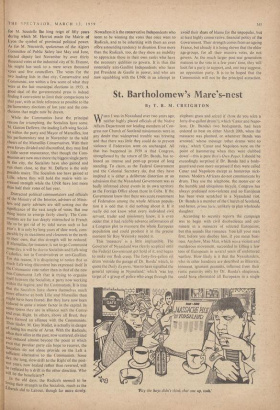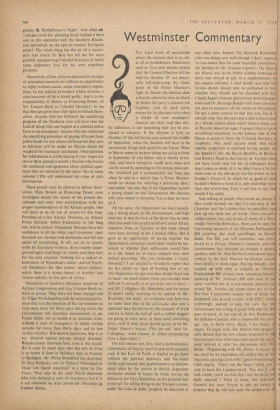St. Bartholomew's Mare's-nest
By T. R. M. CREIGHTON
WHEN I was in Nyasaland over two years ago, neither highly placed officials of the Native Affairs Department nor leading members of Con- gress nor Church of Scotland missionaries were in any doubt that widespread trouble was brewing and that there was little they could do to prevent violence if Federation went on unchanged. All that has happened in 1959 is that Congress, strengthened by the return of Dr. Banda, has re- leased an intense and pent-up protest of long standing. To claim, as the Federal Government and the Colonial Secretary do, that they have inspired it is either a deliberate distortion or an admission that the Nyasaland Government was as badly informed about events in its own territory as the Foreign Office about those in Cuba. If the Government knew that there was acute resentment of Federation among the whole African popula- tion it is odd that it did nothing about it. If it really did not know what. every individual civil servant, trader and missionary knew, it is even odder that it had reliable advance information of a Congress plot to massacre the whole European population and could produce it 'at the precise moment Sir Roy Welensky needed it.
This 'massacre' is a little implausible. The Governor of Nyasaland was clearly sceptical until the Federal Government got hold of it, and began to make our flesh creep. The forty-five-gallon oil drum 'outside the garage of Dr. Banda' which, to quote the Daily Express, 'was to have signalled the general uprising in Nyasaland,' which 'was top target of a group of police who crept through the elephant grass and seized it' (how do you seize a forty-five-gallon drum?), which 'C'aesar and Napo- leon, Dr. Banda's two bodyguards, had been ordered to beat on either March 20th, when the massacre was planned, or whenever Banda was arrested,' whose message 'other drums were to relay,' which 'Caesar and Napoleon were on the point of hammering when they were clubbed down'—this is pure Boy's Own Paper. I should be exceedingly surprised if Dr. Banda had a body- guard and even more surprised if they were called Caesar and Napoleon except as humorous nick- names. Modern Africans do•not communicate by drum. They use the telephone, the motor-car or the humble and ubiquitous bicycle. Congress has always professed non-violence and no European has been even scratched in a Nyasaland riot. Dr;Banda is a member of the Church of Scotland, and hence, prima facie, unlikely to plan wholesale slaughter.
According to security reports the campaign was to begin with civil disobedience and cul- minate in a massacre of selected Europeans; but this sounds like romance. You kill your man first, before you disobey him, if you mean busi- ness. Anyhow, Mau Mau, which was a violent and murderous movement, succeeded in killing a few tens of Europeans in several years of embittered warfare. How likely is it that the Nyasalanders, who in other handouts are described as illiterate, innocent, ignorant peasants, inflamed from their rustic passivity only by Dr. Banda's eloquence, could have eliminated all Europeans in a single 'Pity the boys didn't think that one up, tosh.' ghastly St. Bartholomew's Night? And what ad- vantages could the 'planning brain' behind it have seen in this operation with the Southern Rhode- sian territorials on the spot to reassert European order? The whole thing has the air of a mare's- nest into which Sir Roy has led the for once possibly unsuspecting Colonial Secretary to hatch some nightmare foal for his own expedient purposes.
Meanwhile, all the Africans detained on charges of attempted massacre are without an opportunity to reply; without access, under emergency regula- tions, to the judicial procedure which assumes a man innocent till he is found guilty. And it is the responsibility of Britain as Protecting Power, of Mr. Lennox-Boyd as Colonial Secretary, to see that they are given their full rights to defend them- selves. Anyone who has followed the unedifying progress of the Macharia trial will have seen the kind of things that can happen in a colonial police force in an emergency. Anyone who has witnessed the unedifying procedure of paying Africans from police funds for any chance information they care to fabricate will be under no illusion about the weight of the 'massacre' accusation. (And payment for information is worth having if your wages are two or three pounds a month.) Anyone who knows the confusion and ignorance about political ques- tions that are betrayed by the secret files of some colonial CIDs will understand the value of such information.
These people must be allowed to defend them- selves. Then Britain as Protecting Power must investigate deeply the causes of the present dis- contents and enter into conversations with the proper representatives of the African people, who will have to be let out of prison by this time. Promises of a few African Ministers, an African Prime Minister within Federation in the long run, will be useless. Nyasaland Africans have lost confidence in all the white man's promises; their demands are clamant and immediate and will not admit of temporising. It will not do to restore order by European violence, drive trouble under- ground again and forget its causes, and then wait for the next eruption. Nothing but a radical re- assessment of Nyasaland's status—and of North- ern Rhodesia's for that matter, where unfortu- nately there is a strong chance of trouble—can restore stability to this part of Africa.
Meanwhile in Southern Rhodesia hundreds of African Congressmen and Guy Clutton-Brock re- main in prison. They have not been charged and Sir Edgar Whitehead has told the territorial parlia- ment that it is the intention of the Government to keep them there for thirty days during which the Government will introduce amendments to the Public Order Act to enable it to maintain order without a state of emergency, to detain certain persons for more than thirty days and to ban certain societies. Retroactive legislation, that is to say, directed against persons already detained. Britain cannot intervene here, even if she would. But it must be made clear that this sort of thing is no better if done in Salisbury than in Pretoria or Budapest. Mr. Philip Broadbent has described Sir Roy Welensky and Sir Edward Whitehead as 'those two liberal statesmen' in a letter to The Times. They may be the most liberal statesmen who ever declared a state of emergency, but it is a sad comment on what passes for liberalism in Central Africa.



















































 Previous page
Previous page